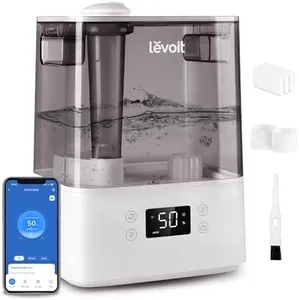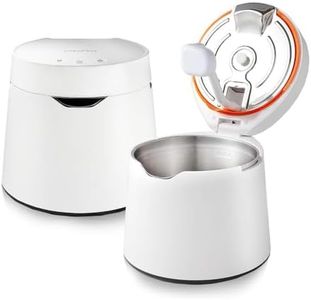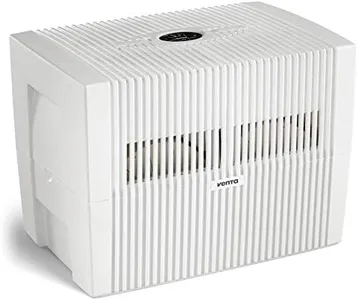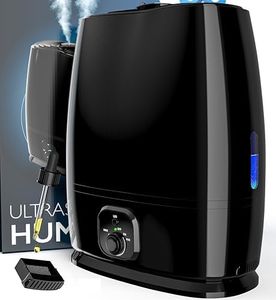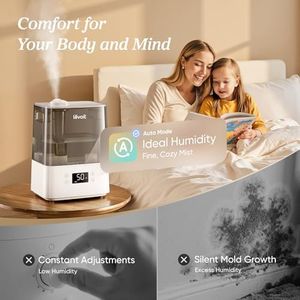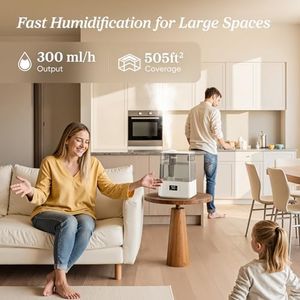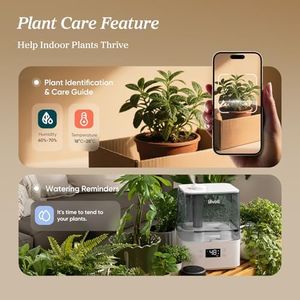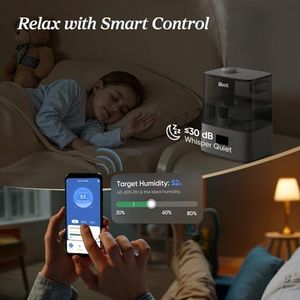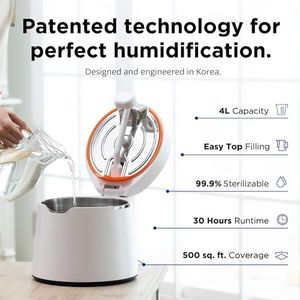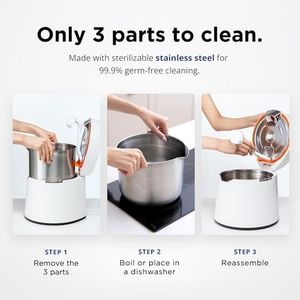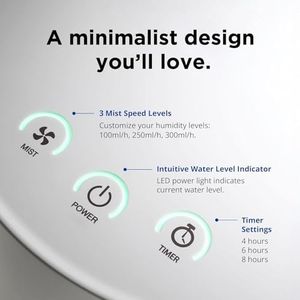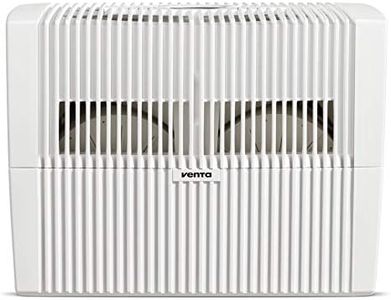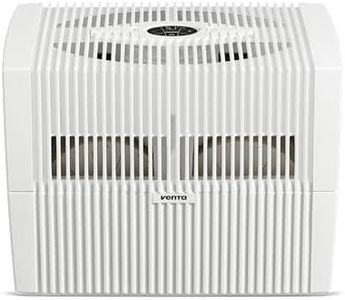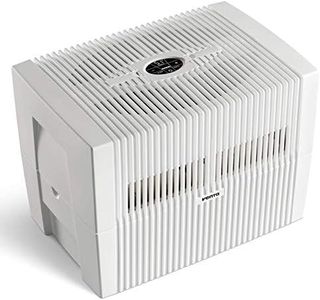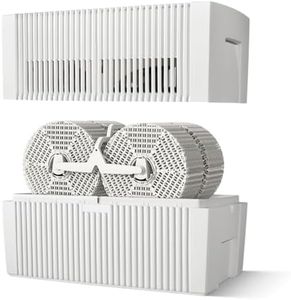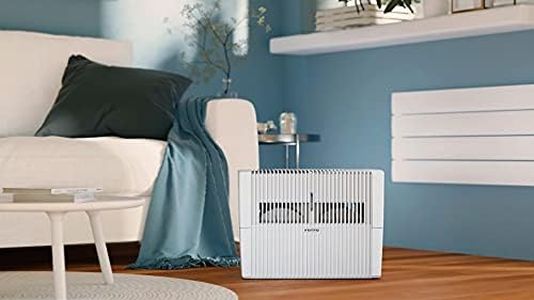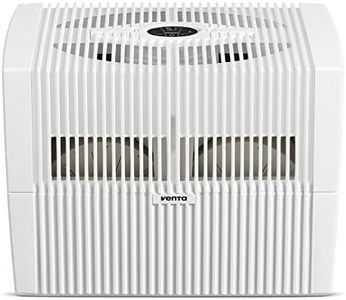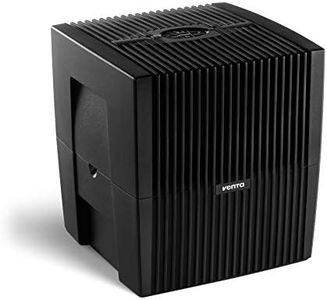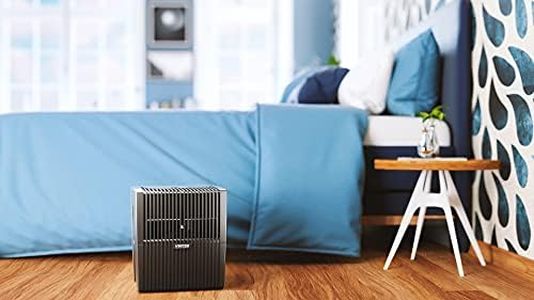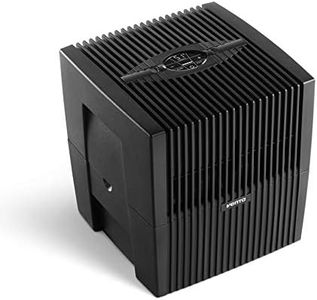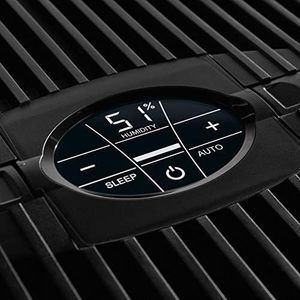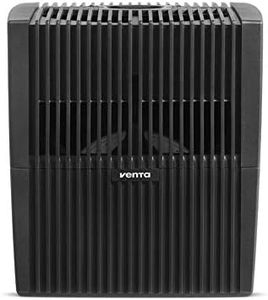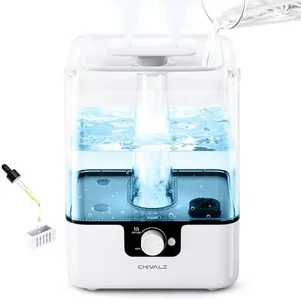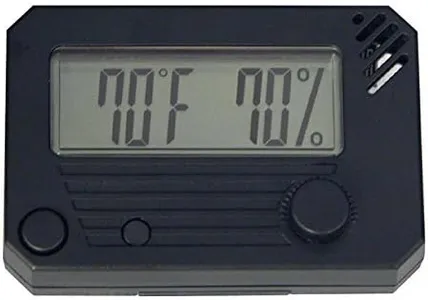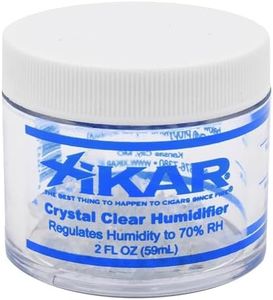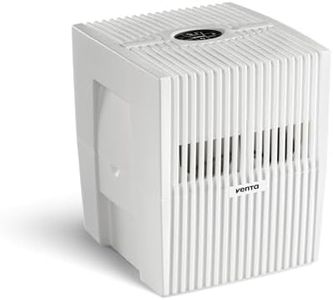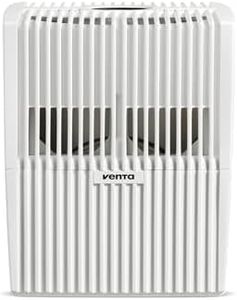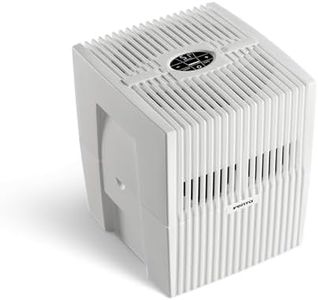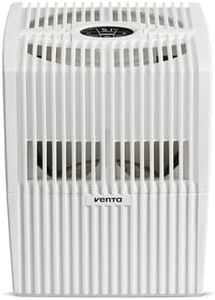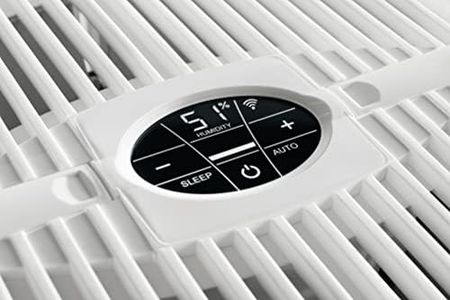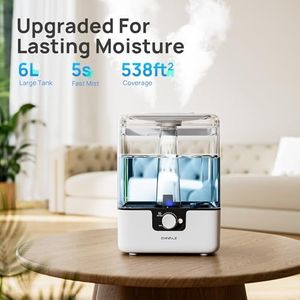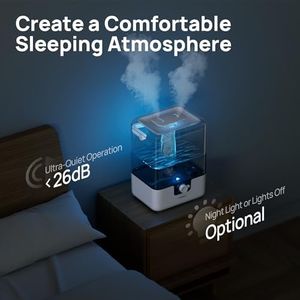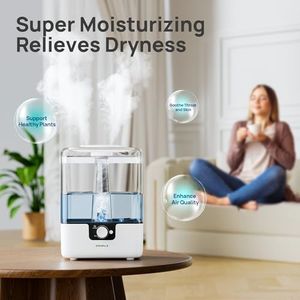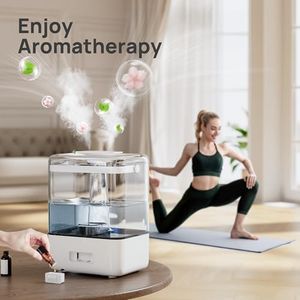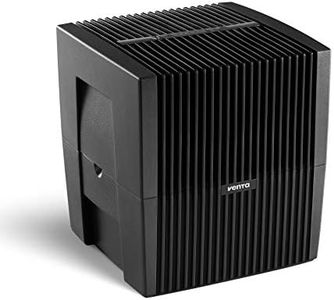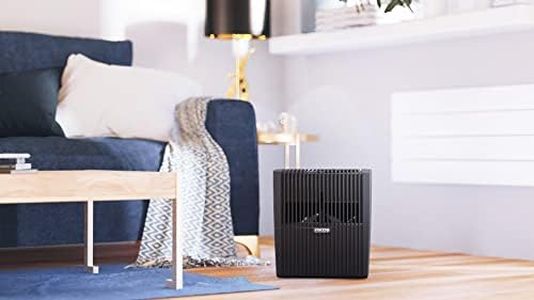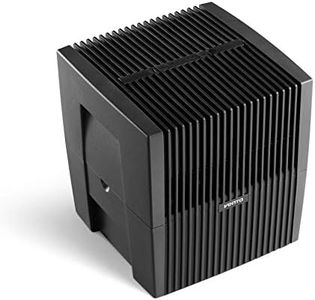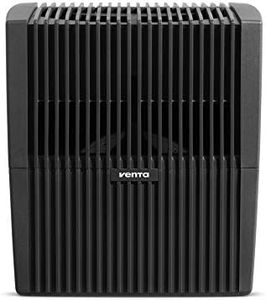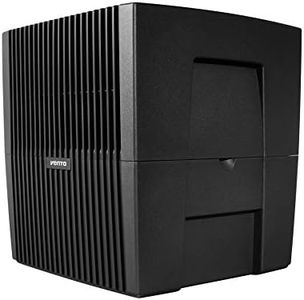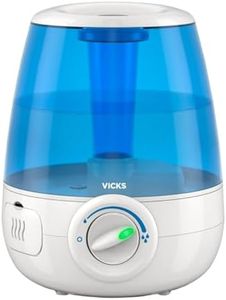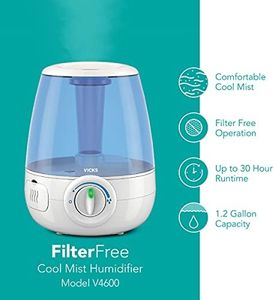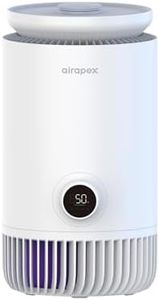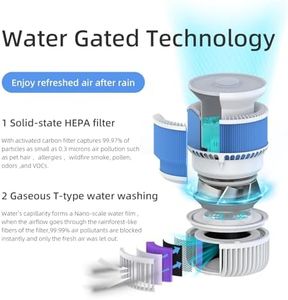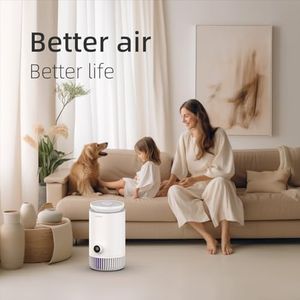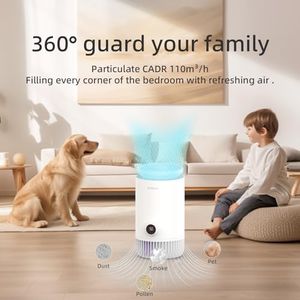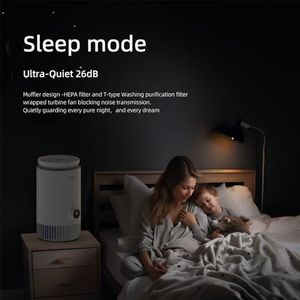10 Best Mold Free Humidifier 2025 in the United States
Winner
LEVOIT Smart Humidifiers for Bedroom Large Room Home,(6L) Cool Mist Top Fill Essential Oil Diffuser for Baby & Plants,Smart App & Voice Control, Rapid Humidification & Auto Mode-Quiet Sleep Mode, Gray
The LEVOIT Smart Humidifier is designed for large rooms and offers a 6-liter tank capacity, which means it can run for up to 60 hours before needing a refill. This makes it ideal for continuous use in spaces up to 505 square feet. The ultrasonic operation ensures quiet performance, with noise levels at or below 30 dB, making it suitable for bedrooms and nurseries. Its top-fill design simplifies refilling and cleaning, addressing common issues with bottom-fill models.
Most important from
28343 reviews
Carepod 31S Stainless Steel Humidifier for Large Room, Quiet & Safe for Baby, Only 3 Washable Parts & Easy to Clean, Ultrasonic Cool Mist Humidifiers for Bedroom, Filter-Free, Lasts 30Hrs (1Gal/4L)
The Carepod 31S Stainless Steel Humidifier is a solid choice if you want a quiet and healthy humidifier for medium to large rooms like bedrooms, nurseries, or offices. Its 4-liter tank can run up to 30 hours on a low mist setting, which means less frequent refills. It covers a decent area suitable for personal spaces but not very large open rooms. The filter-free design is a big plus since it means you don't have to buy or replace filters, while the stainless steel tank is easier to keep clean and resists mold better than plastic tanks.
Most important from
448 reviews
AH550 Original Connect Filter-Free Evaporative Humidifier - Spaces up to 645 ft² - White - WiFi Compatible
The AH550 Original Connect is a filter-free evaporative humidifier designed for medium to large rooms, covering up to 645 square feet including open areas like hallways or lofts. It uses a rotating disk stack to evaporate water, which helps maintain optimal humidity levels between 40-60%, a range known to reduce airborne pollutants naturally and discourage mold growth. Being filter-free means you won’t have extra costs or hassle replacing filters, and it’s safe to use with regular tap water.
Top 10 Best Mold Free Humidifier 2025 in the United States
Winner
LEVOIT Smart Humidifiers for Bedroom Large Room Home,(6L) Cool Mist Top Fill Essential Oil Diffuser for Baby & Plants,Smart App & Voice Control, Rapid Humidification & Auto Mode-Quiet Sleep Mode, Gray
LEVOIT Smart Humidifiers for Bedroom Large Room Home,(6L) Cool Mist Top Fill Essential Oil Diffuser for Baby & Plants,Smart App & Voice Control, Rapid Humidification & Auto Mode-Quiet Sleep Mode, Gray
Chosen by 1482 this week
Carepod 31S Stainless Steel Humidifier for Large Room, Quiet & Safe for Baby, Only 3 Washable Parts & Easy to Clean, Ultrasonic Cool Mist Humidifiers for Bedroom, Filter-Free, Lasts 30Hrs (1Gal/4L)
Carepod 31S Stainless Steel Humidifier for Large Room, Quiet & Safe for Baby, Only 3 Washable Parts & Easy to Clean, Ultrasonic Cool Mist Humidifiers for Bedroom, Filter-Free, Lasts 30Hrs (1Gal/4L)
AH550 Original Connect Filter-Free Evaporative Humidifier - Spaces up to 645 ft² - White - WiFi Compatible
AH550 Original Connect Filter-Free Evaporative Humidifier - Spaces up to 645 ft² - White - WiFi Compatible
Venta LW45 Comfort Plus Humidifier in White - Filter-Free Evaporative Humidifier for Spaces up to 645 ft²
Venta LW45 Comfort Plus Humidifier in White - Filter-Free Evaporative Humidifier for Spaces up to 645 ft²
Venta LW25 Comfort Plus Humidifier in Black - Filter-Free Evaporative Humidifier for Spaces up to 485 ft²
Venta LW25 Comfort Plus Humidifier in Black - Filter-Free Evaporative Humidifier for Spaces up to 485 ft²
Venta LW15 Comfort Plus Humidifier in White - Filter-Free Evaporative Humidifier for Spaces up to 375 ft²
Venta LW15 Comfort Plus Humidifier in White - Filter-Free Evaporative Humidifier for Spaces up to 375 ft²
CHIVALZ 6L Humidifiers for Bedroom Large Room Home, Cool Mist Top Fill Humidifiers for Baby Nursery and Plants, 26dB Quiet, Nightlight, Up to 50 Hours, Oil Diffuser 1 Pack + 2 Mist Outlets White
CHIVALZ 6L Humidifiers for Bedroom Large Room Home, Cool Mist Top Fill Humidifiers for Baby Nursery and Plants, 26dB Quiet, Nightlight, Up to 50 Hours, Oil Diffuser 1 Pack + 2 Mist Outlets White
Venta LW25 Original Humidifier Black - Filter-Free Evaporative Humidifier for Spaces up to 430 ft²
Venta LW25 Original Humidifier Black - Filter-Free Evaporative Humidifier for Spaces up to 430 ft²
Vicks Filter-Free Ultrasonic Humidifier. #1 Brand Recommended by Pediatricians*. 1.2 Gal Ultrasonic cool mist humidifier for medium to large Bedrooms, Kids Rooms, and More. Use with Vicks VapoPads.
Vicks Filter-Free Ultrasonic Humidifier. #1 Brand Recommended by Pediatricians*. 1.2 Gal Ultrasonic cool mist humidifier for medium to large Bedrooms, Kids Rooms, and More. Use with Vicks VapoPads.
AIRAPEX 2 in 1 Air Purifier and Evaporative Humidifier Combo for Bedroom, H13 True HEPA Filter, Cool Mist-Free Air Humidifier evaporative WIFI Connect White
AIRAPEX 2 in 1 Air Purifier and Evaporative Humidifier Combo for Bedroom, H13 True HEPA Filter, Cool Mist-Free Air Humidifier evaporative WIFI Connect White
Our technology thoroughly searches through the online shopping world, reviewing hundreds of sites. We then process and analyze this information, updating in real-time to bring you the latest top-rated products. This way, you always get the best and most current options available.

